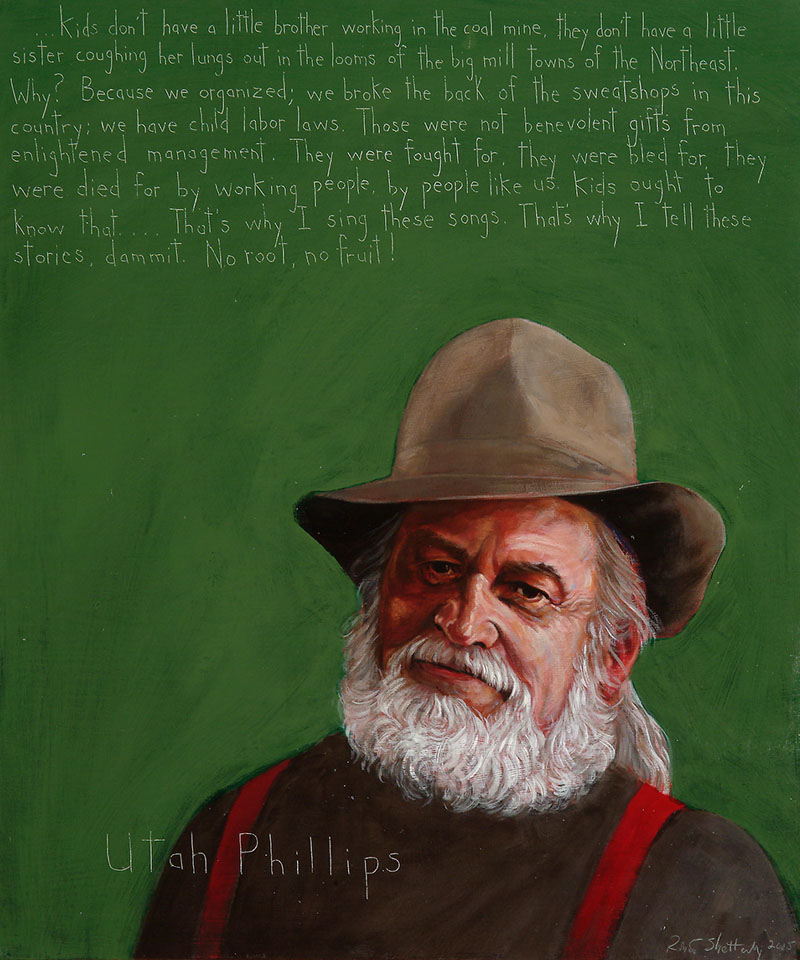
Bruce “Utah” Phillips
Songwriter, Storyteller, Humorist, Philosopher : 1935–2008
“Kids don’t have a little brother working in the coal mine, they don’t have a little sister coughing her lungs out in the looms of the big mill towns of the Northeast. Why? Because we organized; we broke the back of the sweatshops in this country; we have child labor laws. Those were not benevolent gifts from enlightened management. They were fought for, they were bled for, they were died for by working people, by people like us. Kids ought to know that. That’s why I sing these songs. That’s why I tell these stories, dammit. No root, no fruit!”
Biography
When Bruce Phillips was released from the U.S. Army in 1959, after the Korean War, he felt angry, used, and lost. He lived as a hobo for several years, hopping trains and listening to tales from people who had been “spit out” by industrial society. From them, he says, “I got a vision of who I really was and where I came from, something I never got in school.”
But Phillips found more than that: In his home state of Utah, he met Ammon Hennacy, who introduced him to the Catholic Worker movement and to the principles of both nonviolence and anarchy. As a result, Phillips vowed to lay down “the weapons of privilege” and to take personal responsibility each day for making the world a better place. And in Saratoga Springs, New York, he claimed his place in what he calls “the great folk music scare of the 1960s,” adopting “Utah” as his stage name.
Four decades later, slightly slowed by heart disease, Utah Phillips packed cross-generational audiences into venues across the United States. His songs and stories, edgy with pain and piercing humor, tell of working-class and homeless folk, of war and peace. His recordings include I’ve Got to Know (1991); the four-CD Starlight on the Rails: A Songbook (2005); and, in collaboration with Ani DiFranco, The Past Didn’t Go Anywhere (1996), and Fellow Worker (1999), nominated for a Grammy Award. A renowned raconteur, Phillips hosted a weekly National Public Radio program, “Loafer’s Glory: The Hobo Jungle of the Mind,” until 2002.
Committed to taking individual responsibility instead of assigning it to elected officials, Phillips reluctantly voted for the first time in 2004—”to stand in for one of the victims of the kind of brutality that Washington brings to the world.” Then he returned to his own mission: offering levity to lift our souls, compassion to join our hands, and honesty to help us see how we must act.
Programs
Americans Who Tell the Truth (AWTT) offers a variety of ways to engage with its portraits and portrait subjects. Host an exhibit, use our free lesson plans and educational programs, or engage with a member of the AWTT team or portrait subjects.

Education
AWTT has educational materials and lesson plans that ask students to grapple with truth, justice, and freedom.

Exhibits & Community Engagement
AWTT encourages community engagement programs and exhibits accompanied by public events that stimulate dialogue around citizenship, education, and activism.